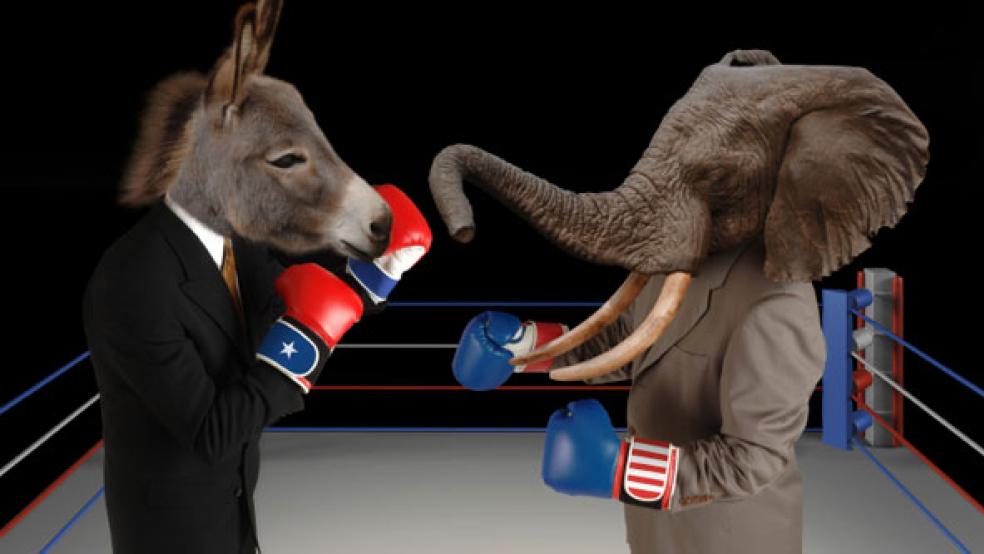Prior to the midterm elections, Republicans made a big issue out of the economic uncertainty supposedly created by Democrats in areas such as health care reform, financial reform, future tax rates, the deficit, environmental regulation, and the long-run viability of our social insurance programs.
Even though there was little to suggest that uncertainty rather than lack of demand was the fundamental economic problem, Republicans were able to persuade many voters that this uncertainty was holding back the economic recovery and lowering long-run economic growth. Electing Republicans, it was argued, would help to eliminate the uncertainty and go a long way toward curing our economic ills.
Does anyone think that uncertainty has been reduced since Republicans gained a majority in the House of Representatives? I certainly don’t.
Let’s look at the record. Upon taking the House, Republicans began looking for ways to make good on their campaign promise to repeal health care reform. Whether they can actually do this or not isn’t clear – so long as Obama is in the White House veto power prevents major change – but even so, challenges in court, promises to cut the funds needed to implement the law, and vows to overturn health care reform at the first opportunity make it much more difficult for businesses and households to make long-run plans. Uncertainty has gone up, not down.
We’ve seen a similar attack on financial regulation. Conservatives have vowed to repeal as much of Dodd-Frank as they can, and to prevent any additional regulation. They have done everything possible to prevent the Consumer Financial Protection Agency from having any teeth, or existing at all, and they retain their misplaced faith that unfettered financial markets are the key to stability rather than an invitation for more problems. Again, precisely how successful they will be over time, and what the regulatory structure will look like in the longer run are uncertain, and it is more difficult than before for businesses to plan for the future.
Republicans have also vowed to privatize Medicare and Social Security, and to substantially reduce the scale of these and other social insurance programs. And, when given the opportunity, they have demonstrated this is more than campaign rhetoric. They intend to privatize and scale down these programs if there’s any way possible to do it, and to continue trying for as long as it takes. It’s hard to see how this increases the financial security of the elderly, the unemployed, and the unhealthy, or how it promotes a more certain economic environment.
And then there’s the biggest of them all, the fight over the debt ceiling. It would be bad enough to hold the nation’s future hostage over an ideological dispute in the best of times, but to do so at a time when we are struggling to recover from the most severe recession since the Great Depression, a time when millions and millions can’t find jobs and must rely upon programs Republicans are trying to cut, is unconscionable. And this is not the first time Republicans have done this. Remember when Republicans threatened to undermine the recovery if Democrats tried to raise taxes on the wealthy? It was a clear threat – if we don’t get our way, the economy gets it.
And the current threat is even worse. The consequences if Republicans miscalculate and cause a default could be severe. In the short-run, default would cause immediate and large cuts in government spending potentially undermining the recovery, perhaps even sending the economy back into recession. Default would also create a shock to financial markets that would amplify the negative economic effects. In the longer run, interest rates would be driven permanently higher lowering economic growth, and default would undermine the dollar’s place in world financial markets, something that would have uncertain but potentially serious consequences.
And think of the precedent this sets. In the future, we can expect more of this. Democrats are likely to retaliate at the first opportunity, and Republicans have already shown – more than once – that they are willing to hold the nation hostage over ideological issues. How does that promote long-run stability?
There will be a big sigh of relief when the fight over the debt ceiling ends, at least I hope it ends with relief – there’s no guarantee that it will. But if an agreement is reached, we should be careful not to think that the overall level of uncertainty has been reduced below where it was before Republicans took control of the House. Republicans will simply move on to the next target, and then the target after that – why not so long as it works. Until they are done with their efforts to impose their ideological will through whatever means necessary, holding the nation hostage, whatever it takes, the uncertainty will persist.
The president might have been able to stop this behavior had he stood up to the threat the first time Republicans played this game. But he didn’t, and once again he seems inclined to meet enough Republican demands to end the threat to the economy. Where does that leave us? At this point, we, the people, are the only hope. This won’t stop unless the next election tells both Republicans and the Democrats who enable them, in no uncertain terms, that this behavior will not be tolerated.
Read more on the economy from The Fiscal Times
What Debt Limit? Plan B is the 14th Amendment
How the Fed Could Touch Off a New Recession






